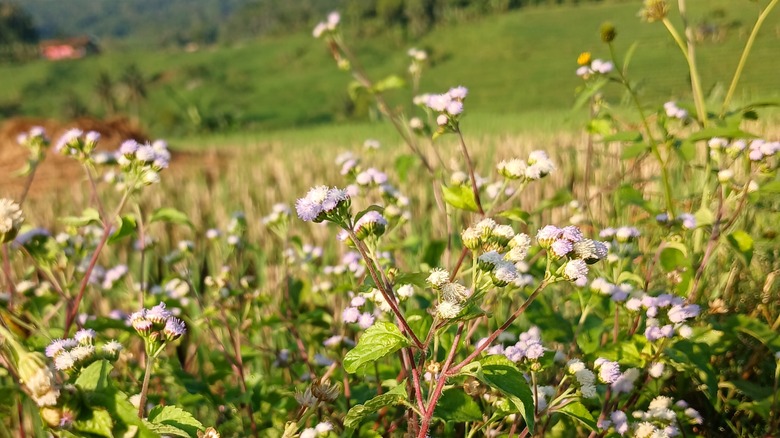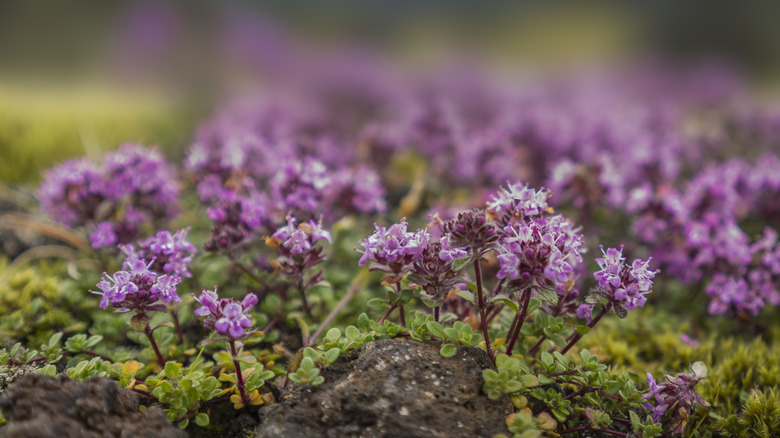Ground Cover Vs Cover Crop: Which Is Better For Keeping Out Weeds
Weeds can be a hassle when all you want is a thriving outdoor environment around your home. Their invasive nature makes them difficult to control and snuff out. Weeds easily seed and germinate on bare, sun-exposed soil. Your war against them is going to be an uphill battle. On the other hand, you could use plants to do the heavy lifting. Ground covers and cover crops sound similar, but have different roles in your yard and garden. The one thing they do have in common, however, is suppressing weeds. Choosing between them as weed control, however, depends on which issues you currently are dealing with in your lawn.
When you're trying to grow a garden, weeds can stunt the growth of other plants because they are in competition for the same resources. Once the weed senses it's near another plant, it will act quickly gathering all the nutrients and water so it can grow tall and soak up more sun. But when you bring in cover crops and ground covers, you get the upper hand on the battle. If you need to clear out a large area of weeds and create healthier soil in your yard and garden, a cover crop will do the job. Or if you need to cover a dry patch in your yard to prevent the weeds from taking over the area, a ground cover is more suitable. Both have their particular place and function. So, let's compare the two to help you determine which option is better depending on your situation and objective.
Subdue weeds with cover crops
Unlike other vegetables in your garden, a cover crop isn't grown for harvest. Rather, you'll plant a cover crop in the spring or fall when and if the ground is bare. In some instances, with specific crops like corn, you can plant it at the same time to reduce weeds. Growing a cover crop can provide immense benefits to the land you grow it on, including preventing soil erosion, covering your bare lawn, and supplying the local wildlife with food and habitat. An actively growing cover crop will also win the resources they need in competition with weeds. Some varieties of cover crops will change the composition of the soil which will slow down the weeds' growth and prevent or delay their germination.
Cover crops that will help you suppress weeds in your garden are legumes and non-legumes. Legume cover crops include varieties of clover, vetch, and peas. Non-legume cover crops consist of cereal plants like rye, wheat, oats, barley, and various grasses. A good combination of both will help you suppress the most weeds while renewing your soil. In the spring, make sure you plant it early enough so it will die from a hard frost when it's not overgrown. And in the fall, plant it late enough for winter to freeze it over. You don't want the cover crop to grow to its full height. Otherwise, they might end up as weeds, too.
The role of ground covers
Ground covers are a game changer for your yard. They are not a crop you need to seed, grow to snuff out weeds, then let it freeze over. Instead, they are low-growing plants that often spread themselves over the ground. They are ideal in yards and landscaping because they prevent soil erosion, can fill in the gaps or dry spots in the yard, and suppress weeds. They are perennials that can stay in the garden and come back every year. It can be easy-to-grow ground cover plants once you get them settled and established in their designated area.
Weeds don't often stand a chance against ground cover because of their ability to spread and grow densely together. You can easily maintain your ground covers by keeping them trimmed back. One great ground cover to suppress weeds is creeping thyme. It's dense and crowds out weeds as it grows. Cranesbill is nearly invincible, tolerating heat, drought, pests, and deer. Strawberries can make a tasty, edible ground cover that can limit weed growth, too.
Depending on what you need for controlling weeds will determine if you should use a cover crop or ground cover. If you have a garden bed or large plot that needs the weeds controlled and the ground nourished, a cover crop is probably the best option. If you're looking to add some plants to your landscape, suppress weeds, and maintain them year after year, ground covers are a good fit. The good news is that both will work for keeping weeds out of your yard and garden.


